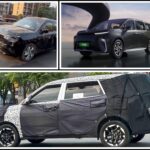India’s automotive industry is on the cusp of a transformative phase, with global electric vehicle (EV) giant Tesla leading the charge. Recent developments, including a significant reduction in import duties and Tesla’s aggressive hiring and expansion plans, suggest that the Indian market is poised to welcome foreign automakers. While this presents exciting opportunities for Indian consumers, it also raises questions about the challenges domestic brands will face in this evolving landscape. Here’s a detailed look at the latest updates, speculative insights, and what the future holds for India’s automotive sector.
India’s New EV Policy: A Green Light for Tesla and Global Players
The Indian government is set to notify a new Electric Vehicle (EV) Policy that aims to attract global automakers by reducing import duties on premium EVs. Under the proposed policy, companies that meet specific investment and manufacturing criteria will benefit from a 15% import duty, a massive reduction from the current 110% tariff. This policy is designed to encourage global players like Tesla to establish a foothold in India while promoting local manufacturing.
Key Highlights of the EV Policy:
- Reduced Import Duty: Companies can import up to 8,000 premium EVs annually at a reduced duty of 15%.
- Investment Requirements: Manufacturers must invest a minimum of Rs 4,150 crore and achieve progressive turnover targets:
- Rs 2,500 crore by the second year
- Rs 5,000 crore by the fourth year
- Rs 7,500 crore by the fifth year
- Local Manufacturing: Approved companies must set up manufacturing facilities within three years and achieve 25% local value addition within five years.
This policy is expected to benefit Tesla significantly, with reports suggesting that the company plans to enter India by April 2025 with an affordable EV priced at Rs 21-22 lakh. Tesla is also reportedly scouting locations for showrooms in Mumbai (BKC) and Delhi (Aerocity), signaling its readiness to tap into the Indian market.
Tesla India Entry: What We Know So Far
Tesla India Entry has been a topic of speculation for years, but recent developments indicate that the wait may soon be over. Here’s what we know about Tesla’s India strategy:
- Affordable EV Launch:
Tesla is expected to debut in India with an affordable EV priced around Rs 21 lakh, likely manufactured at its Berlin plant. This move aligns with Tesla’s goal of making its vehicles accessible to a broader audience. - Showroom Expansion:
The company is reportedly finalizing locations for its showrooms in Mumbai, Delhi, and Bangalore, with plans to start sales by the third quarter of 2025. - Local Manufacturing:
While Tesla will initially import its vehicles via the Completely Built Unit (CBU) route, the company has hinted at setting up a local manufacturing plant in India, depending on market response. Maharashtra is rumored to be a potential location for this facility. - Hiring Spree:
Tesla has already begun hiring for 13 roles in India, including positions in sales, service, and operations. This indicates that the company is laying the groundwork for a robust presence in the country.
Other Global Automakers Joining the Fray
Tesla isn’t the only global automaker eyeing India’s EV market. Companies like Hyundai and Volkswagen have also expressed interest in the new EV policy. While their investment plans remain uncertain, the reduced import duties and favorable policy environment could incentivize these players to accelerate their India strategies.
Challenges for Indian Automakers
While the entry of foreign brands like Tesla is a boon for consumers, it poses significant challenges for domestic automakers. Here’s what Indian brands need to watch out for:
- Intensified Competition:
Tesla’s entry will raise the bar for quality, technology, and performance, forcing Indian automakers to innovate and upgrade their offerings. - Price Sensitivity:
With Tesla planning to launch an affordable EV, domestic brands may struggle to compete on price, especially in the premium segment. - Infrastructure Gaps:
The success of EVs depends on robust charging infrastructure. While foreign brands may invest in private charging networks, Indian automakers will need to collaborate with the government and private players to address this gap. - Consumer Perception:
Global brands like Tesla enjoy a strong reputation for innovation and sustainability. Indian automakers will need to invest in branding and marketing to change consumer perceptions and build trust.
Opportunities for Collaboration and Growth
Despite the challenges, the entry of foreign automakers also presents opportunities for Indian brands:
- Technology Transfer:
Collaborations with global players could facilitate technology transfer, helping Indian automakers enhance their EV capabilities. - Supply Chain Development:
The establishment of local manufacturing facilities by foreign brands could boost India’s EV supply chain, benefiting domestic players. - Government Support:
The Indian government’s push for EV adoption, coupled with incentives for local manufacturing, provides a conducive environment for growth.
Conclusion: A New Era for India’s Automotive Industry
Tesla’s impending entry into India, supported by the government’s new EV policy, marks the beginning of a new era for the country’s automotive industry. While this presents exciting opportunities for consumers and the economy, it also underscores the need for Indian automakers to adapt and innovate. As global and domestic players vie for market share, the ultimate winner will be the Indian consumer, who stands to benefit from advanced technology, competitive pricing, and a greener future.




